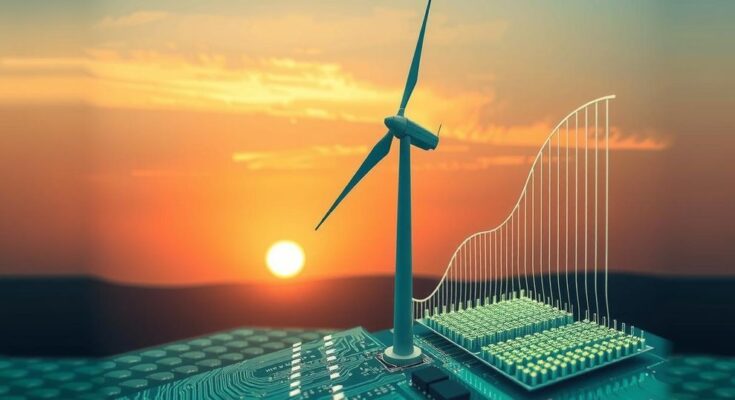Artificial Intelligence (AI) has the potential to significantly impact energy consumption and greenhouse gas emissions. While tech companies face rising emissions from powering data centers for AI, such tools could also drive the energy transition by enhancing efficiency. However, balancing AI’s energy demands with its benefits requires a collaborative approach, exemplified by initiatives like the World Economic Forum’s Artificial Intelligence Governance Alliance.
When assessing energy consumption, AI systems vary, but they generally require substantial electricity. Training models like ChatGPT demands ten times more power than a simple Google search, contributing to the growing energy demand from data centers. Major players like Microsoft and Google have noted an increase in their CO2 emissions due to these expanded operations.
AI currently comprises about 2-3% of the technology sector’s emissions, but projections suggest this will rise as AI becomes integral to businesses and services. Generative AI systems can be particularly energy-intensive, using around thirty-three times more energy than traditional software for specific tasks. With the rapid evolution of AI, the need for more data centers looms, escalating energy demands and straining electrical grids.
Training advanced models like GPT-3 uses around 1,300 MWh, equivalent to the annual energy usage of 130 average US homes. The advanced GPT-4 potentially escalates this requirement fifty-fold. Each advancement in AI capabilities results in doubled computational needs approximately every 100 days, creating pressing questions about the balance of AI’s societal benefits against environmental costs.
The need for improved energy efficiency in the AI industry is critical. Regulatory bodies, including the European Parliament, are beginning to enforce energy consumption logging, while innovations in hardware, such as specialized chips, aim to reduce energy use and increase AI efficiency. Additionally, data centers are exploring cooling technologies and sites that leverage electricity availability to enhance performance sustainably.
AI’s impact extends to the electrical grid amid rising demands from population growth and trends toward electrification. Energy-efficient data centers are crucial in the move toward a net-zero economy, with companies pursuing nuclear power and carbon-removal technologies to offset emissions. Moreover, AI can facilitate the integration of renewable energy sources, improving grid stability by predicting energy production fluctuations effectively.
These advancements can lead to more efficient carbon-intensive industries, optimizing everything from energy use in buildings to predictive agricultural management. Navigating the complexity of AI’s energy demands while enhancing societal benefits demands a multifaceted approach. Initiatives by the World Economic Forum’s Governance Alliance aim to harness AI for advancing sustainability, underscoring the need for cross-sector collaboration in transforming energy consumption patterns.
AI is reshaping the energy landscape, presenting both the potential for emissions reduction and increased energy demands. Major tech companies are witnessing rising emissions due to data centers for AI. While AI could enhance energy efficiency, its current energy use raises concerns, necessitating a balance through regulatory measures and innovative technologies.
In summary, while AI brings the promise of enhanced efficiency and sustainability in the energy sector, it also carries an increasing demand for power that could exacerbate greenhouse gas emissions if left unchecked. Collaborative initiatives, regulatory oversight, and advancements in hardware and efficiency are crucial to ensuring that AI contributes positively to the energy transition while mitigating its environmental impact.
Original Source: www.weforum.org



